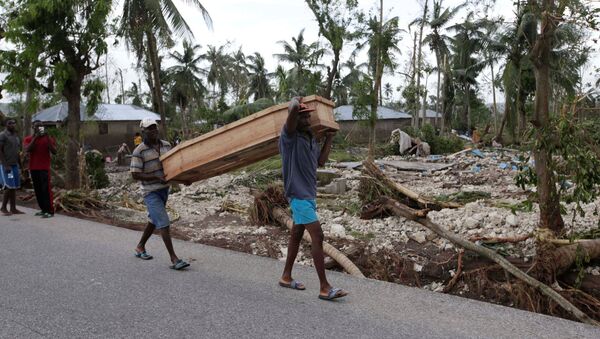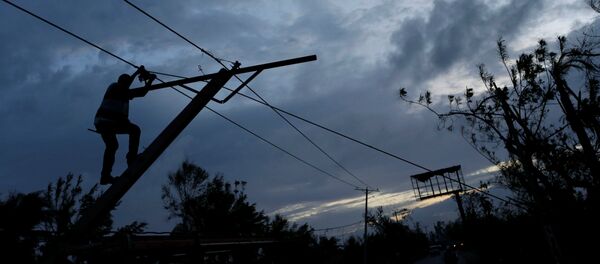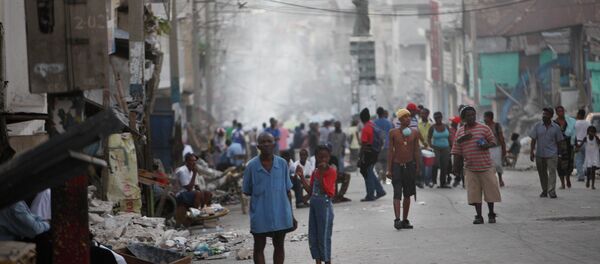Haiti was devastated by Hurricane Matthew last week, after the storm smashed across its southwest coast. The death toll on the island has reached 1,000, according to Reuters tallies of local official announcements, and the dead are being buried in mass graves in hard-hit areas like the town of Jeremie, which is receiving media attention for the scope of its devastation.
The UN announced an appeal of nearly $120 million October 10 to fund emergency aid programs in the country.
“Hundreds have died. At least 1.4 million people need assistance at this time. Some towns and villages have been almost wiped off the map. Crops and food reserves have been destroyed. At least 300 schools have been damaged,” UN Secretary-General Ban Ki-moon told reporters at UN headquarters Monday.
“These numbers and needs are growing as more affected areas are reached. Tensions are already mounting as people await help. A massive response is required.”
The World Health Organization (WHO) announced October 11 that it was sending 1 million doses of cholera vaccine to Haiti. "The top priority for those people affected by the hurricane is to give them access to clean water. That is the only way we can control cholera," Dominique Legros, WHO cholera expert, told reporters, Deutsch Welle reported. Multiple reports say more than 200 cases of the disease have emerged since the hurricane.
The secretary-general also said the UN was “developing a new approach to the cholera situation. This will encompass support for people affected by the disease and for efforts to build sound water, sanitation and health systems in order to help eliminate cholera in Haiti.”
A UN soldier is blamed for introducing cholera into the country in 2010. Since then, some 10,000 people have died of the disease and more than 770,000 have been infected, according to a March 2016 NPR report.
Haiti’s interim president, Jocelerme Privert, added famine to the list of terrors left in the storm’s wake. Food, water and medicine is needed immediately, he said, describing the damage as “apocalyptic,” according to the BBC. "But the concern is if we don't take action now for the longer impact … three to four months when the foods stop coming we are going to have a real famine," he said, the BBC reports.
Holly Frew, emergency communications manager for the aid group CARE, told NPR October 10 that the devastation in the island nation is comparable to what followed the 2010 earthquake in the country, estimated to have killed up to 316,000 people. The official tally of the earthquake’s death toll has proven controversial.
Some say it is worse. "It seems to me like a nuclear bomb went off," said Paul Edouarzin, a UN Environmental Programme employee, according to an October 10 Al Jazeera report.
"In terms of destruction – environmental and agricultural – I can tell you 2016 is worse than 2010."
Washed out roads and gutted infrastructure in the struggling nation are preventing aid from getting to stricken remote communities on the island’s western tip, which bore the brunt of the storm’s force. Aid began arriving via helicopter and ship October 7, but getting supplies to people most in need is challenging. There are reports of residents blocking some of the passable roads to main towns to prevent aid caravans from going by without delivering to their communities. A convoy attempting to reach a remote valley struck by a mudslide was attacked by gunmen, the coordinator of the Civil Protection Agency of the island’s hard-hit Grand-Anse department said, the LA Times reported.
"There's no water, no antibiotics," Herby Jean, a doctor in the western coastal village of Dame Marie, told The Associated Press. "Everything is depleted… We hear helicopters flying overhead, but we're not getting anything."
Nearby in the town of Marfranc, health worker Darline Derosier tended 40 patients while waiting for assistance to arrive, Stripes.com reported. “People will die soon if we don't get some aid,” she said.
In a France 24 report, the UN Humanitarian Coordinator in Haiti told aid organizations to deliver supplies to small rural communities, where subsistence farmers have seen their crops washed out. Delivering only to urban centers will only create overcrowding, as people migrate toward where they can access aid.
"We must think about developing a plan, to coordinate support and deliver it where it's most needed and not where it's easiest to access," Wahba said.
Indeed, the arrival of aid agencies does not necessarily herald great change. The American Red Cross has received furious criticism after an NPR and ProPublica report revealed that the organization had built all of six permanent homes in the country with the $500 million it raised for assistance in the aftermath of the 2010 quake.




